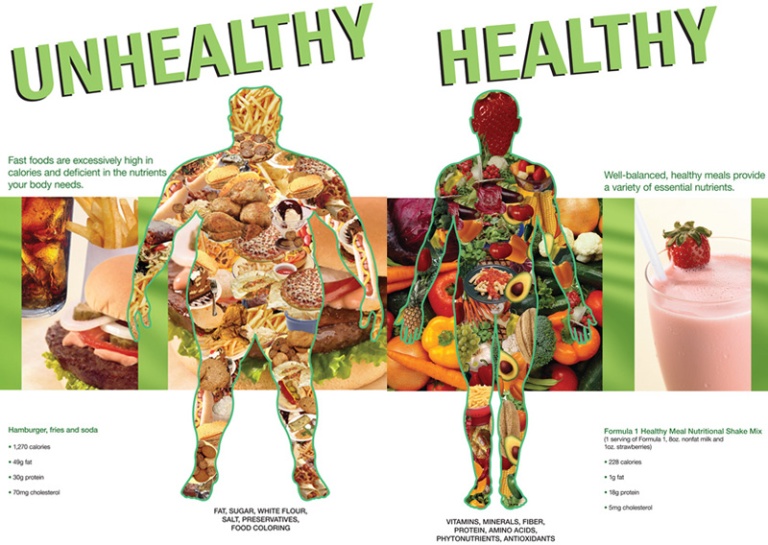92% of U.S. Population Has Vitamin Deficiency. Are You One of Them?
Just like air and water, the human body also requires vitamins and minerals that are essential for you to stay alive. Not only do vitamins and minerals keep your body healthy and functional, they protect you from a variety of diseases. Although we live in a country that has an abundant food supply, research shows that Americans are significantly deficient in many essential nutrients. And despite having an over-abundant food supply in the United States, the health implications of these nutrient deficiencies cannot be understated.
Developed nations have long considered themselves immune to the problem of malnutrition due to food fortification programs and an overabundant food supply. In the United States, “the land of plenty,” calories are not hard to come by. In fact, the average American consumes a whopping 3,600 calories per day. However, emerging research demonstrates that despite being extremely well-fed as far as calories are concerned, Americans suffer from a wide range of nutritional deficiencies with significant health implications. More than half the calories Americans consume come from nutrient-depleted, ultra-processed foods, including refined flours and industrial seed oils. Therefore, it comes as no surprise that so many people in this country are undernourished.
Several factors are responsible for this “well-fed but undernourished” epidemic that’s sweeping the United States. These factors include a diet with a high intake of processed foods, declining levels of nutrients in our soils, and the increasing prevalence of chronic health conditions that influence our need for these nutrients. So, even if processed junk food and fast food were not a part of the food supply, the fact is, deficiencies would still be rampant, as soil quality is diminishing at a rapid rate and reducing the nutrient value of fruits and vegetables.
The numbers don’t lie. According to the Centers for Disease Control (CDC) and the U.S. Department of Agriculture (USDA):
9 out of 10 Americans are deficient in potassium
7 out of 10 are deficient in calcium
8 out of 10 are deficient in vitamin E
50 percent of Americans are deficient in vitamin A, vitamin C, and magnesium
More than 50 percent of the general population is vitamin D deficient, regardless of age
90 percent of Americans of color are vitamin D deficient
Approximately 70 percent of elderly Americans are vitamin D deficient
For example, vitamin A deficiency reduces immune system function and causes night blindness. Vitamin C deficiency hinders the body’s endogenous antioxidant systems, reducing its ability to combat oxidative stress. Vitamin D deficiency, which afflicts U.S. adults and teens at shockingly high rates, impairs immunity and increases the risks of osteoporosis, autoimmune disease, metabolic syndrome, and diabetes.
The standard American diet is a nutritional travesty. In parts of the developed world such as the United States, the diets are high in calories but low in nutrition. Furthermore, a person who consumes a steady diet of high-calories and low-nutrition, has a higher risk of becoming nutrient deficient. To make matters worse, fruits, vegetables, meat, and dairy provide a much smaller share of the average American’s daily calorie intake today than they did 40 years ago. This is a shame because these foods happen to be some of the most nutrient-rich choices available.

Additionally, as a result of modern intensive agricultural methods, unhealthy soils are producing nutrient-poor foods. These agricultural methods are harming our health not only by exposing us to ever-increasing levels of pesticides, but also by stripping nutrients from the soil in which our food grows. This results in food with lower levels of micronutrients. In addition, as crop yields have increased with the rise of intensive agriculture, a “diluted effect” has taken place, further lowering the average concentrations of minerals in crops.
Your body requires 13 essential vitamins and 13 essential minerals every day. Vitamins and minerals help your body grow and work the way it should. The 13 vitamins are: vitamins C, A, D, E, K, and the B vitamins (thiamine, riboflavin, niacin, pantothenic acid, biotin, B6, B12, and folate).
Vitamins have different jobs–helping you resist infections, keeping your nerves healthy, and helping your body get energy from food or your blood to clot properly. By following the Dietary Guidelines, you will get enough of most of these vitamins from food. Some minerals, like iodine and fluoride, are only needed in very small quantities. Others, such as calcium, magnesium, and potassium, are needed in larger amounts. As with vitamins, if you eat a varied diet, you will probably get enough of most minerals.
Federal guidelines suggest minimum daily amounts for vitamins and key minerals. However, unless you need to increase your intake for specific ones because of a deficiency or other medical reason, following so many numbers can be confusing.
The best approach that ensures you get a variety of vitamins and minerals, and in the proper amounts, is to adopt a broad healthy diet. This involves an emphasis on fruits and vegetables, whole grains, beans and legumes, low-fat protein, and dairy products. The good news is that many common foods contain multiple mineral and vitamin sources, so it is easy to meet your daily needs from everyday meals.
References:
https:// thebiostation.com/bioblog/nutrient-iv-therapy/do-you-have-vitamin-deficiency/
https:// kresserinstitute.com/well-fed-but-undernourished-an-american-epidemic/
Terms of Use
The contents of this website are for educational purposes and are not intended to offer personal medical advice. You should seek the advice of your physician or other qualified healthcare provider with any questions you may have regarding a medical condition. Never disregard professional medical advice or delay in seeking it because of something you have read on this website. TheTommyExperience.net does not recommend or endorse any products.




I love your blog.. very nice colors & theme. Did you create this website yourself or did you hire someone to do it for you? Plz respond as I’m looking to design my own blog and would like to know where u got this from. kudos
I just added this site to my google reader, excellent stuff. Can’t get enough!